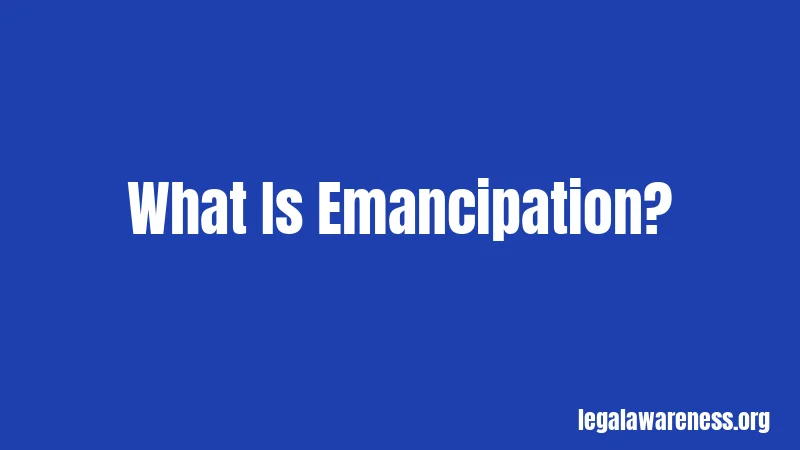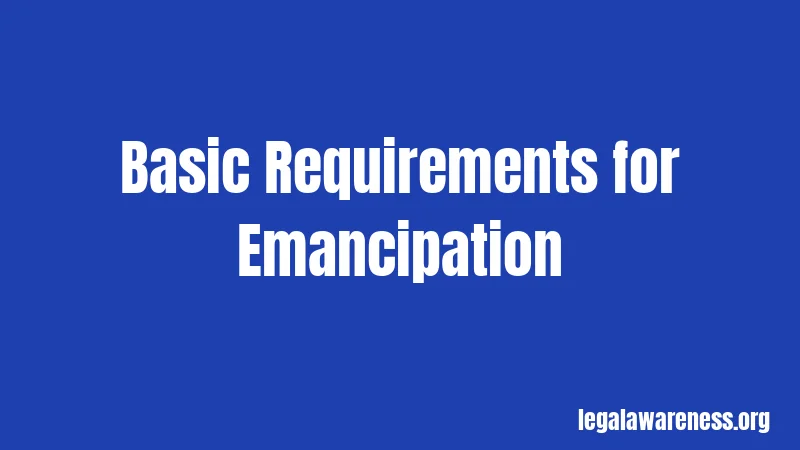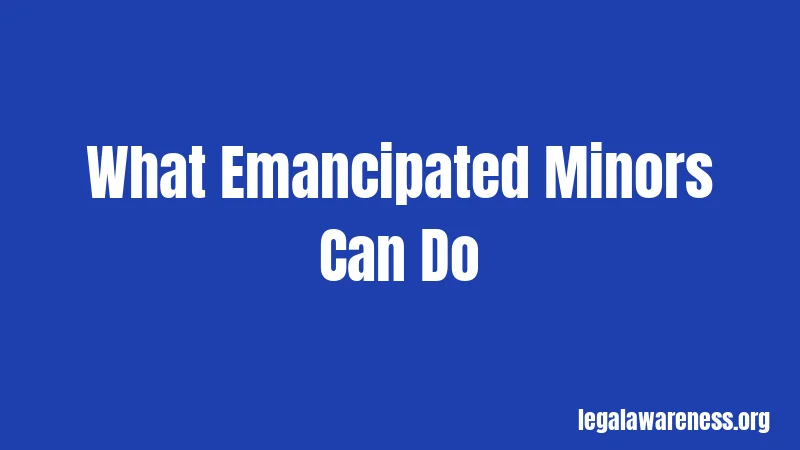Emancipation Laws in New York (2026): No Court Orders Here
Most states let minors go to court and ask for emancipation. New York doesn’t work that way. Seriously. The rules here are totally different from what you might expect.
Here’s the deal. New York has no official emancipation process. You can’t just file paperwork and get declared emancipated. Instead, emancipation happens as part of other court cases, usually child support disputes.
What Is Emancipation?

Emancipation means you’re legally free from your parents’ control. You make your own decisions. You support yourself financially. Your parents no longer have to take care of you.
In most states, this happens at 18. Not in New York. Parents here must support their kids until age 21. Yep, that’s three extra years compared to most places.
But emancipation can happen earlier under certain conditions. Let’s break down exactly how.
How New York Handles Emancipation Differently
New York doesn’t issue emancipation orders. Period. There’s no form to fill out. No judge will sign a document saying you’re emancipated just because you ask.
Sound confusing? It actually makes sense once you understand it.
Emancipation in New York is “ancillary.” That’s a fancy legal word meaning it happens alongside something else. For example, during a child support case, a judge might declare a teen emancipated. This means the parent doesn’t have to pay support anymore.
But that declaration only applies to that specific case. It doesn’t give you a special legal status for everything else.
Basic Requirements for Emancipation

To be considered emancipated in New York, you must meet specific requirements. You need to be at least 16 years old. Under 16? The courts won’t consider you emancipated, no matter what.
You must live apart from your parents. Going away to college doesn’t count if you plan to come home during breaks. You need your own permanent residence.
You must be financially independent. This means you pay for your own food, housing, clothes, and other necessities. You can’t be getting money from your parents (unless it’s court-ordered child support or Social Security benefits).
Pretty straightforward, right?
Ways You Can Become Emancipated
Military Service
If you join the military before age 21, you’re automatically emancipated. Any branch counts. The military gives you adult legal status.
But remember, you need parental permission to enlist before age 18. So this path requires cooperation from your parents initially.
Marriage
Getting married before age 21 can lead to emancipation. But here’s where it gets tricky.
In New York, you must be 18 to get married. No exceptions. The state banned all marriages under 18 back in 2021. Before that, 17-year-olds could marry with court approval.
So if you’re 18 to 20 and get married, you’ll likely be considered emancipated. Marriage shows you’re taking on adult responsibilities.
Full-Time Employment
This is probably the most common path. If you’re 16 or older and have a full-time job, you might be emancipated.
Full-time means more than just working summers. You need steady employment. You need to pay your own bills. Car payments, phone bills, rent, food – all of it.
Some teens work 30 to 35 hours a week and contribute to household expenses. Courts have declared these teens emancipated. Honestly, this is the part most people miss.
But there’s a catch. If you’re a full-time student, courts are reluctant to declare you emancipated. They want to see that you’re paying all your own education costs too.
Leaving Home Without Good Reason
A teen can be emancipated by leaving home voluntarily. But not just any teen. Not for any reason.
You must be at least 16. You must refuse to follow reasonable parental rules. You must abandon your parents’ home deliberately.
The courts call this “withdrawing from parental control.” It’s serious stuff. This isn’t about having a fight and staying with a friend for a week. It’s about permanently leaving.
Hold on, this part is important. If you left home because of abuse, neglect, or another valid reason, your parents might still have to support you. The court won’t consider you emancipated in that situation.
What Emancipated Minors Can Do

If you’re emancipated and under 18, you gain some rights. You can keep your wages. Nobody can take your paycheck.
You can live in your own home. You can choose which school to attend in your neighborhood. You can receive certain public benefits.
You can even ask the court for child support if your parents forced you to leave home. Makes sense, right?
What You Still Can’t Do
Being emancipated doesn’t make you a full adult. There are still major restrictions.
You need parental permission for working papers until age 18. You need permission for a learner’s permit or driver’s license. You need permission for routine healthcare (except emergencies, STD treatment, family planning, or drug treatment).
You can’t buy alcohol or tobacco until 21. You can’t vote until 18. These age restrictions apply to everyone.
Wait, it gets better. You can’t sign a contract that you’re actually stuck with. Minors can “disavow” contracts in New York. That means you can back out, but the other party can’t.
Proving Your Emancipated Status
Schools and agencies sometimes ask for “emancipation papers.” But remember, New York courts don’t issue these.
What they’re really asking for is proof. An affidavit works. That’s a sworn statement explaining why you’re emancipated.
You might write that you’re 17, live on your own, work full-time, and pay all your own expenses. Get it notarized. That’s usually enough.
Not sure what counts as proof? Ask the organization requesting it. They’ll tell you what they need.
The Child Support Connection
Here’s where things get serious. Most emancipation determinations happen during child support cases.
A non-custodial parent might stop paying support. They claim the child is emancipated. The custodial parent disagrees. Both sides go to court.
The judge examines the situation. Is the teen living independently? Are they self-supporting? Did they leave home for a good reason or bad?
Based on the answers, the judge decides whether to continue or stop child support. That’s when emancipation gets officially recognized.
When Emancipation Can Be Reversed
Okay, pause. Read this carefully.
Emancipation isn’t always permanent. Circumstances change. A teen might become unemancipated.
For example, you join the military at 18. You’re emancipated. Then you get discharged at 19. You might become unemancipated again.
Or you leave home and support yourself. Later, you move back home and let your parents take care of you. Emancipation can be reversed.
This happens more often than you’d think. Life is unpredictable. Courts understand that.
College and Emancipation
Many people assume college students are emancipated. They’re not. Attending college doesn’t automatically make you independent.
Living in a dorm doesn’t count as being emancipated. Especially if you come home during breaks. Especially if your parents are paying tuition.
But if you’re paying all your own college costs and living expenses? That’s different. Courts might consider you emancipated in that situation.
Public Benefits and Support
If you’re emancipated and need help, you might qualify for public benefits. It depends on your situation.
But here’s what happens. Social Services will ask your parents to pay support. Unless you refused their home or reasonable rules without good reason, they’re still responsible.
If you were kicked out or abused, you can live separately. But your parents still owe you support. Don’t worry, we’ll break it down step by step.
Contact The Door if you need help. It’s a center for young people ages 12-21. They can guide you through living independently and getting assistance.
Special Circumstances
Some situations are unique. Child stars who earn substantial income might seek emancipation. They want control over their money.
Teens in residential facilities or juvenile detention can be declared emancipated. It depends on the specific circumstances.
Teens who completely reject their parents might be emancipated. There’s a case where a child adopted her stepfather’s name, hadn’t seen her biological father in five years, and considered him just “biological” – not paternal. The court granted emancipation.
Each case gets evaluated individually. Courts look at all the facts.
The Age 21 Rule
You’re not alone, this confuses a lot of people. Why 21?
New York is one of the few states that requires parental support until 21. It’s about ensuring young adults have support through college years.
Most parents agree to extend support to age 22 if their child is in college full-time. They put this in separation agreements. But courts must approve it.
Unless you’re emancipated, your parents are legally responsible until your 21st birthday.
What to Do If You Want Emancipation
First, understand you can’t just ask a court to emancipate you. There’s no direct process.
You need to wait for a related court case. Usually child support. Or you need to establish that you already meet the requirements.
Are you 16 or older? Living on your own? Paying all your bills? Congratulations. You might already be functionally emancipated.
If someone asks for proof, prepare an affidavit. Explain your living situation. Explain your income. Explain how you’re independent.
Trust me, this works.
Getting Help and Resources
If you’re in a bad home situation, don’t just run away. Get help first. Running away without good reason could hurt your case.
If you’re being abused, call the authorities. Document the situation. Your parents might still owe you support even if you leave.
Legal aid organizations can help. They offer free or low-cost assistance. Look for family law attorneys who understand New York’s emancipation rules.
The Door (ages 12-21): Offers comprehensive services for young people living independently.
Legal Aid Society: Provides free legal help for qualifying individuals.
Don’t try to navigate this alone. Resources exist to help you.
Common Mistakes to Avoid
Thinking you can just file for emancipation. You can’t. New York doesn’t work that way.
Leaving home impulsively without a plan. You need steady income and housing first. Otherwise, you’re just a runaway, not emancipated.
Assuming emancipation gives you full adult rights. It doesn’t. Age restrictions still apply.
Not getting proof of your status. Create that affidavit. You’ll need it.
These mistakes are totally avoidable if you know the rules.
The Reality Check
Let’s be honest. Emancipation sounds appealing when home life is tough. But it’s hard. Really hard.
You’re responsible for everything. Rent, food, utilities, healthcare, transportation. No backup if things go wrong.
You can’t easily go back. Once emancipated, reversing it takes time and court involvement.
Most teens are better off working things out at home. Or getting help from authorities if there’s abuse. Emancipation should be a last resort.
Think carefully before pursuing this path. Talk to adults you trust. Consider all your options.
Recent Legal Changes
New York raised the marriage age to 18 in 2021. No exceptions. Before that, 17-year-olds could marry with court approval.
This affects emancipation because marriage used to be a path for 17-year-olds. Not anymore.
In October 2021, support rights might extend to age 26 for disabled children living with parents. This is relatively new.
Laws change. Stay informed about current rules.
Frequently Asked Questions
Can I go to court and ask to be emancipated in New York?
No. New York has no official emancipation process. Emancipation only gets determined as part of another court case, usually involving child support.
What’s the minimum age for emancipation in New York?
You must be at least 16 years old. Under 16, courts won’t consider you emancipated under any circumstances.
If I’m emancipated, do I have all the rights of an adult?
No. You still need parental permission for certain things until 18 (working papers, driver’s license, routine healthcare). Age restrictions on voting, alcohol, and tobacco still apply.
Does going to college make me emancipated?
Not automatically. Living in a dorm and coming home for breaks doesn’t count. But if you pay all your own college costs and living expenses, you might be considered emancipated.
Can emancipation be reversed?
Yes. If you return home and submit to parental control, or if circumstances change (like being discharged from the military), you can become unemancipated again.
Do my parents have to support me until I’m 21?
Yes, unless you become emancipated. New York requires parental support until age 21, which is longer than most states.
What if I leave home because of abuse?
Your parents might still have to support you. Leaving for a valid reason like abuse doesn’t automatically emancipate you. Contact authorities and legal aid for help.
How do I prove I’m emancipated if someone asks?
Create an affidavit. That’s a sworn, notarized statement explaining your age, living situation, employment, and financial independence. Schools and agencies usually accept this.
Final Thoughts
Emancipation in New York is complicated. There’s no simple court process. You can’t just file paperwork and get declared independent.
But if you meet the requirements – you’re 16 or older, living independently, and financially self-sufficient – you might already be emancipated in practice.
Just remember that emancipation comes with real responsibilities. You’re on your own for everything. Make sure you’re truly ready before pursuing this path.
When in doubt, talk to a lawyer. Get advice specific to your situation. Legal aid organizations exist to help people just like you.
Stay informed. Stay safe. And know that help is available if you need it.
References
- Legal Assistance of Western New York – Emancipation in New York – Updated September 2025
- New York Courts – Emancipated Child Information – Official court resource
- LawHelpNY – How Can I Be Free From My Parents – Updated February 2025
- New York Domestic Relations Law § 15-A – Marriage age restrictions
- Stephen Bilkis & Associates – New York Emancipation FAQs – Updated September 2025
